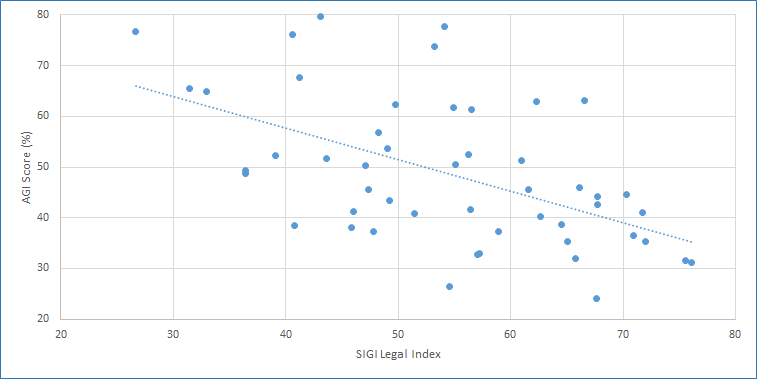Ensuring strong equitable legal frameworks as an accelerator for gender equality in Africa
March 2022 - Legal frameworks that discriminate against women often go hand in hand with larger gender gaps in the economic, social and political spheres. The recently released SIGI 2021 Regional Report for Africa1 introduces for the first time the SIGI Legal Index, which scores national legal frameworks against their degree of gender-based discrimination. By assessing both formal and informal laws2 across 15 legal indicators, it takes into account the pluralistic nature of many African legal frameworks. The Africa Gender Index (AGI) (AfDB and UNECA, 2020), which measures gender inequality in outcomes in Africa, reveals the negative impact of such discriminatory laws on gender equality and women’s empowerment (Figure 1).
|
Figure 1: Legal frameworks have a negative impact on women’s outcomes relative to men’s Correlation between the SIGI Legal Index (legal frameworks) and the AGI scores (outcomes)
Note The figure presents the estimated level of gender inequality in outcomes as measured by the AGI, and the level of gender-based discrimination in legal frameworks as measured by the SIGI Legal Index. Higher AGI scores indicate greater levels of parity in outcomes. An AGI score between 0% and 100% indicates gender inequality in favour of men, while a score of 100% represents parity between men and women. SIGI Legal Index scores range from 0 to 100, with 0 indicating no discrimination and 100 indicating absolute discrimination in legal frameworks. Source: Authors’ own calculations based on (OECD, 2019), Gender Institutions and Development Database (GID-DB) and (AfDB and UNECA, 2020), Africa Gender Index |
The analysis shows that discriminatory laws persist and that the parallel existence of customary with constitutional, common and civil law remains a challenge in many African countries. Although national governments throughout Africa have signed and ratified international, regional and sub-regional agreements and instruments aiming to promote women’s empowerment and gender equality, legal barriers continue to prevent women from being fully empowered. For example, the SIGI Legal Index reveals that legal frameworks governing workplace rights continue to establish an unequal playing field. In 28 African countries,3 women are legally forbidden from entering certain professions deemed as hazardous, which limits their access to labour markets. These prohibitions are often rooted in stereotypes regarding men’s and women’s abilities, specifically physical abilities, as well as in traditional gender roles. Although legislation prohibiting women from entering certain sectors is often framed around concern over women’s health or safety, it is inherently discriminatory and serves to promote persistent gender-based occupational and sectoral segregation.
Conversely, the SIGI 2021 Regional Report for Africa shows that legal frameworks prohibiting gender-based discrimination foster women’s empowerment. For example, 34 of the 54 African countries have legal quotas in place to ensure women’s representation in lower houses of parliaments/legislatures, and nine countries have voluntary quotas. Data reveals that among the 20 African countries with the highest female political representation, 18 have some kind of quota in place and 13 have legislated/constitutional quotas. Nonetheless, women’s ability to participate in the political sphere and to be elected is not only related to legal frameworks. Efforts are needed to address the underlying drivers that limit women’s empowerment – in the political sphere but also across all other areas of girls’ and women’s lives.
Policy makers are thus advised to couple the below legal reforms, from the outset, with awareness-raising campaigns and programmes that shift norms and practices – while taking into account the pluralistic legal frameworks of Africa:
- Eliminate laws that exempt customary law from legal prohibitions of discrimination, such as those included in constitutions.
- Ratify the Maputo Protocol, CEDAW and other relevant sub-regional legal instruments, such as the Southern African Development Community’s (SADC) Gender Protocol (2008).
- Align national legislation with the standards set forth by these international, regional and sub-regional agreements.
References
- AfDB and UNECA (2020), Africa Gender Index Report 2019 - Analytical report. What the 2019 Africa Gender Index tells us about gender equality, and how can it be achieved
- OECD (2021), SIGI 2021 Regional Report for Africa, Social Institutions and Gender Index, OECD Publishing, Paris, .
Browse the SIGI and the Gender, Institutions and Development Database.
1. The SIGI 2021 Regional Report for Africa was launched following a consultation process organised collaboratively by the OECD, the AfDB and UNECA, which engaged nearly 1 000 stakeholders through nine policy dialogue events held in West, Southern and East Africa.
2. Angola, Benin, Burkina Faso, Burundi, Cameroon, Central African Republic, Chad, Côte d'Ivoire, Djibouti, Egypt, Equatorial Guinea, Ethiopia, Gabon, Guinea, Guinea-Bissau, Lesotho, Libya, Madagascar, Mali, Mauritania, Morocco, Nigeria, Republic of the Congo, Senegal, Sierra Leone, Somalia, Sudan and Tunisia.
3. The SIGI Legal Index is created by aggregating one of the three types of variables that make up the SIGI legal variables, while excluding the others pertaining to attitudes and practices. The SIGI’s legal variables evaluate the level of discrimination in countries’ formal and informal legal frameworks across 15 of the SIGI’s 16 indicators. Informal laws are laws defined by the customs, religions and traditional practices observed among a specific community, outside of the formal legal code that may or may not be written.
Related Documents


